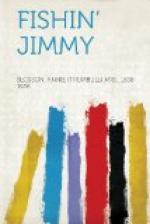He had never heard of entomology. Guenee, Hubner, and Fabricius were unknown names; but he could have told these worthies many new things. Did they know just at what hour the trout ceased leaping at dark fly or moth, and could see only in the dim light the ghostly white miller? Did they know the comparative merits, as a tempting bait, of grasshopper, cricket, spider, or wasp; and could they, with bits of wool, tinsel, and feather, copy the real dipterous, hymenopterous, or orthopterous insect? And the birds: he knew them as do few ornithologists, by sight, by sound, by little ways and tricks of their own, known only to themselves and him. The white-throat sparrow with its sweet, far-reaching chant; the hermit-thrush with its chime of bells in the calm summer twilight; the vesper-sparrow that ran before him as he crossed the meadow, or sang for hours, as he fished the stream, its unvarying, but scarcely monotonous little strain; the cedar-bird, with its smooth brown coast of Quaker simplicity, and speech as brief and simple as Quaker yea or nay; the winter-wren sending out his strange, lovely, liquid warble from the high, rocky side of Cannon Mountain; the bluebird of the early spring, so welcome to the winter-weary dwellers in that land of ice and show, as he
“From the bluer deeps
Lets fall a quick, prophetic strain,”




